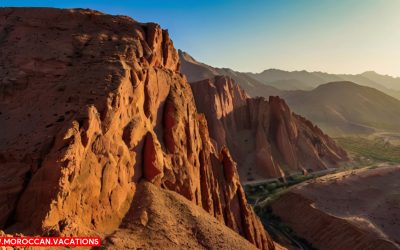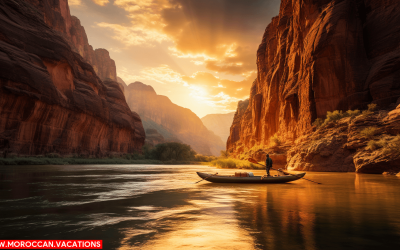Understanding the High Atlas
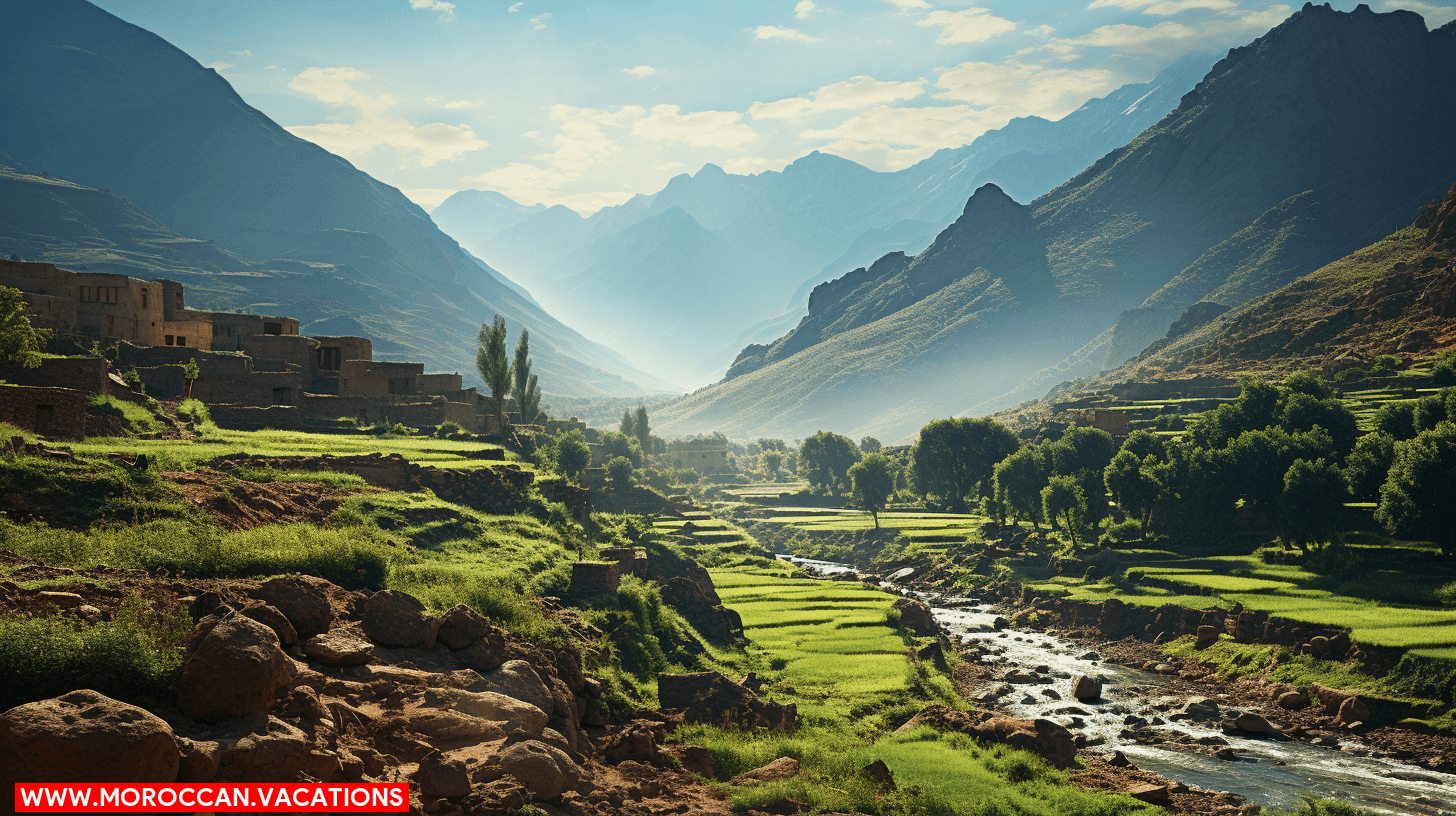

You think you’ve seen it all, don’t you? But, you’ve yet to lace up your boots for a trek through Morocco’s High atlas. Here, you’ll wander ancient Berber villages, navigate rugged trails, and marvel at snow-capped peaks. You’ll meet locals who redefine hospitality and encounter wildlife beyond your wildest dreams. So, grab your hiking gear and let’s start this epic exploration. After all, it’s not just a trek, it’s a journey into the heart of Morocco.
You’ll find the High Atlas is no ordinary mountain range; it’s a spectacular fusion of steep valleys, rugged peaks, and centuries-old Berber villages. In this majestic landscape, the Atlas geology whispers tales of ancient tectonic forces, shaping these mighty mountains over millions of years. You’ll feel the thrill of freedom as you explore, each footstep taking you deeper into the heart of a world crafted by nature’s artistry.
The High Atlas isn’t just a testament to geologic time. It’s also a showcase of climate variations, painting a vivid picture of the Earth’s ever-changing moods. The lower slopes, warmed by the African sun, are home to argan trees and hardy cacti. As you ascend, you’ll notice the vegetation shifting, mirroring the changing climate. You’ll wander through fragrant juniper forests and, if you’re daring enough, even find yourself crunching through snow at the highest peaks.
In the High Atlas, you’re not just an observer. You’re a participant in an ongoing dance between the Earth and the elements. Here, amidst the raw beauty of nature, you’ll find a freedom that’s as vast and untamed as the mountains themselves. This is the adventure of the High Atlas, waiting for you to uncover.
Preparing for Your Trek
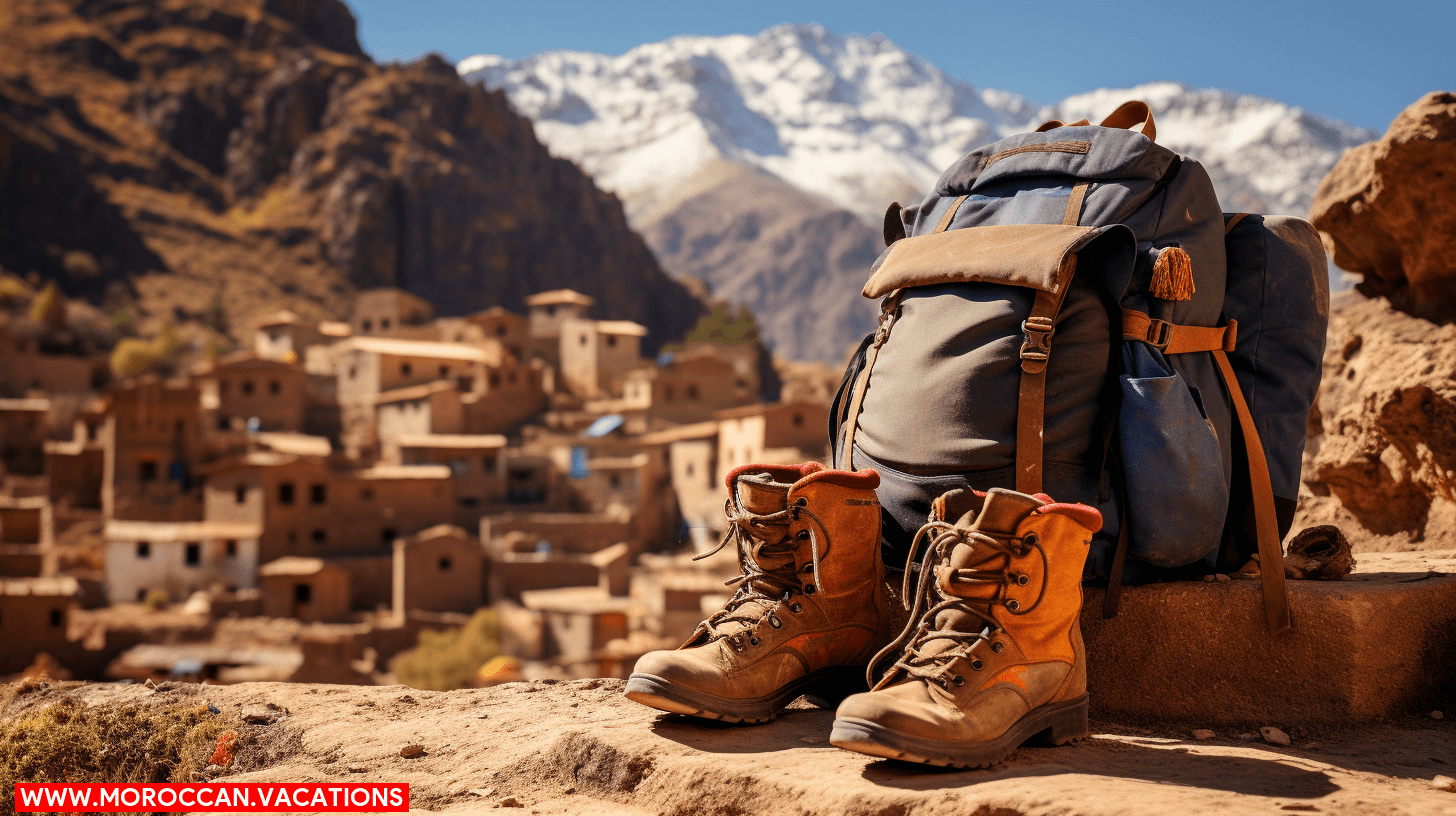

Before setting off on your High Atlas adventure, it’s crucial to pack the right gear and plan carefully to ensure a safe and enjoyable trek. You need to consider acclimatization techniques and dietary considerations, among other factors.
Your gear should provide comfort and protection against varying weather conditions. Your diet should fuel your body with the right amount of nutrients. Acclimatize to minimize the risks of altitude sickness, starting with a gradual ascent and staying hydrated.
Let’s dive into these factors more closely:
| Factor | Description | Suggestions |
| Gear | Essential for protection | Waterproof jacket, hiking boots, sunscreen |
| Diet | Fuels your body for the trek | High-protein foods, hydrating drinks |
| Acclimatization | Prevents altitude sickness | Gradual ascent, stay hydrated |
Berber Villages: A Cultural Overview
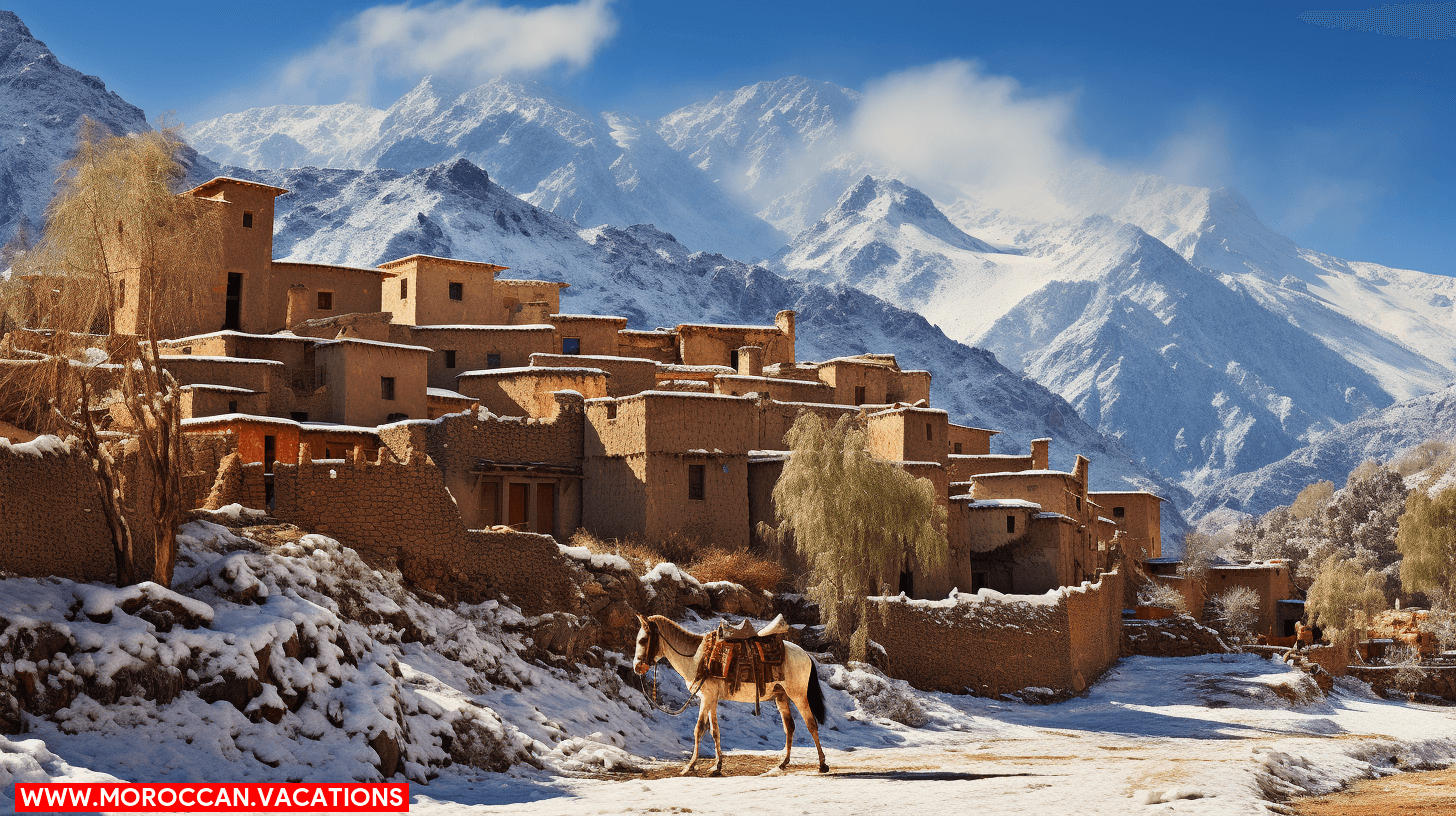

On your journey through the High Atlas, you’ll come across the heart of Morocco’s cultural heritage: the Berber villages, nestled amidst rugged mountains and lush valleys. These clusters of stone houses, with their flat roofs and winding alleyways, are a living testament to a centuries-old way of life that remains largely unchanged.
- Berber Cuisine Exploration: You’ll have a chance to sample local dishes, like the slow-cooked tangia or the hearty barley soup, known as tchicha. Each meal is a delightful adventure for your taste buds.
- Traditional Berber Clothing: You’ll see locals wearing djellabas, a loose-fitting robe, and women adorned in colorful takchitas, a two-piece dress. This vibrant attire is not only practical for the climate but also represents their rich culture.
- Community Life: The villagers thrive on their close-knit communities. You’ll observe them working together in the fields, sharing meals, and celebrating festivals in a harmony that’s truly inspiring.
- Natural Beauty: Amidst the rugged landscape, you’ll find lush valleys, cascading waterfalls, and serene gorges. This backdrop adds to the charm of these villages and offers endless opportunities for exploration.
Immerse yourself in the Berber way of life, and you’ll leave with a deeper understanding of Morocco’s cultural heritage.
Navigating the Mountain Trails
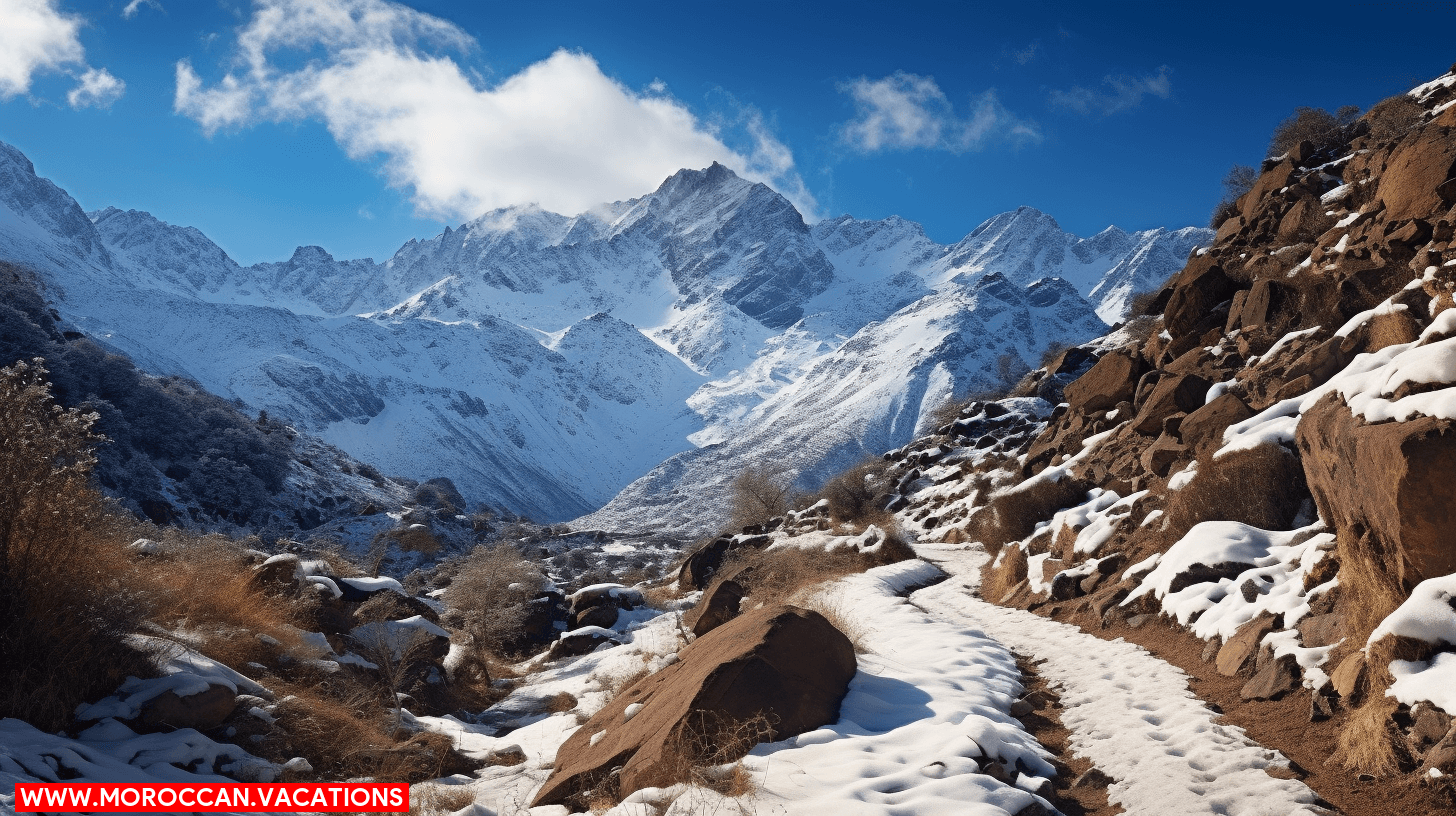

Where do you start when it’s time to navigate the mountain trails of the High Atlas? Trail mapping is a must. Don’t consider this a chore, rather, think of it as an adventure! Every turn you take, every path you follow, it’s all part of your journey.
You’ll experience the freedom of the mountains, but remember altitude acclimatization is key. The higher you climb, the thinner the air becomes, so give your body time to adjust. It’s a slow, steady process, but it’s crucial for a successful trek.
To help you on your journey, consider this table:
| Trail Mapping | Altitude Acclimatization |
| Plan your route | Take your time |
| Learn the terrain | Stay hydrated |
| Prepare for changes | Rest plenty |
| Have a backup plan | Listen to your body |
| Trust your instincts | Don’t rush |
Trail mapping and altitude acclimatization are not just terms, they are lifelines in the High Atlas. They’re your guides to freedom and exploration. So, when you’re standing on a trail, map in hand, breathing in the thin mountain air, remember these points. Your adventure awaits!
Meeting the Locals: Berber Hospitality
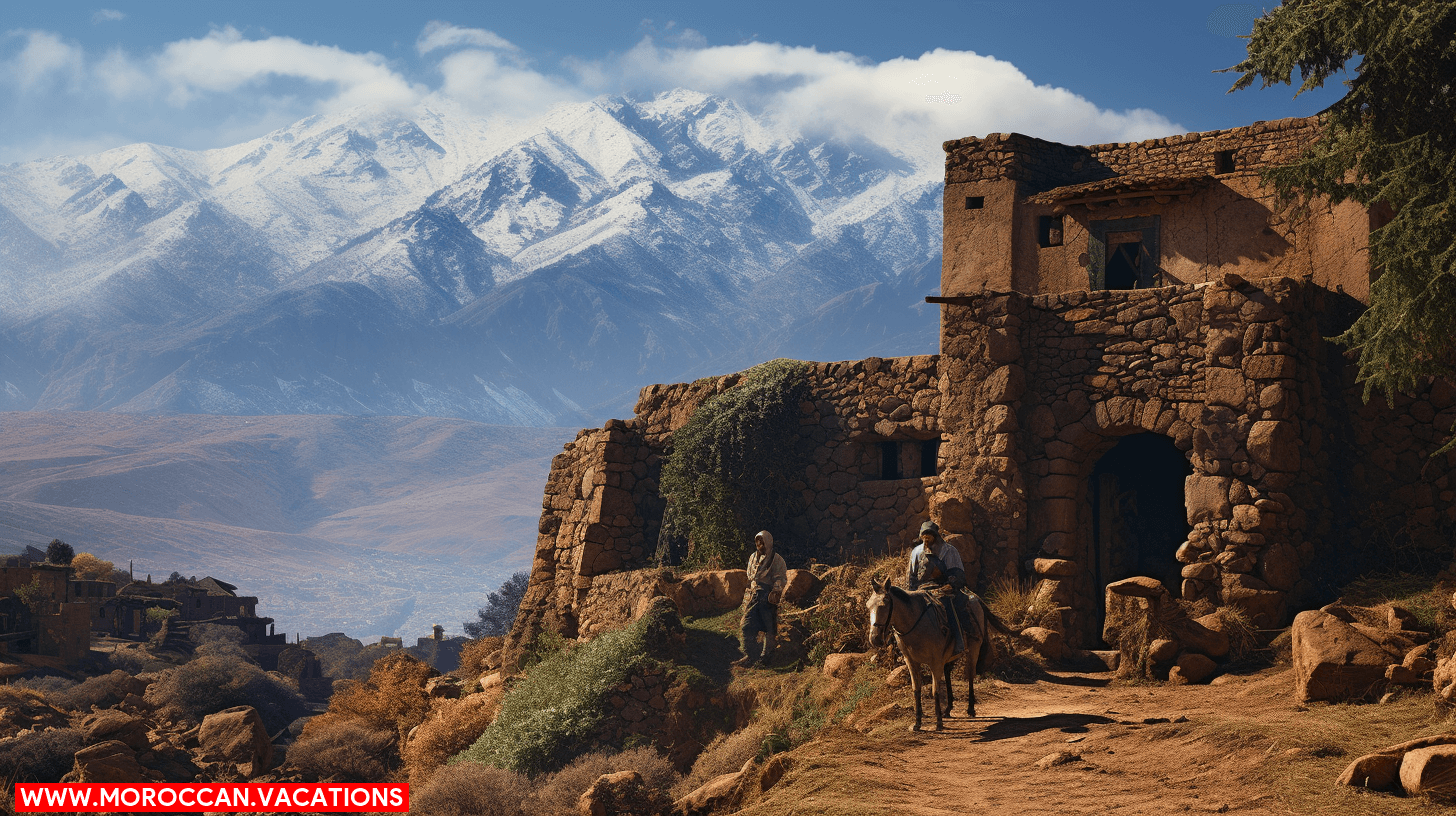

As you navigate through the labyrinth of trails and adjust to the altitude, the warm Berber hospitality awaits to enrich your mountainous adventure. You’re not just a passerby here; you’re a welcomed guest, embraced into a world rich with tradition and warmth.
To truly appreciate the Berber hospitality, here are 4 experiences you shouldn’t miss:
- Savor Berber Cuisine: You haven’t truly experienced the High Atlas until you’ve tasted a homemade Berber tagine, slow-cooked to perfection over a wood fire. The flavors are as vibrant and hearty as the people themselves.
- Witness Traditional Handicrafts: Admire the skill and artistry of the locals as they create intricate pottery, woven textiles, and stunning jewelry. Each piece tells a story of their heritage.
- Join in Local Celebrations: There’s no better way to understand a culture than through its festivals and music. Let loose, dance, and become one with the community.
- Share a Berber Tea Ceremony: This isn’t just a cup of tea, it’s a ritual symbolizing friendship and hospitality. Accept the invitation and deepen your connection with the Berber people.
The Breathtaking Scenery of the High Atlas
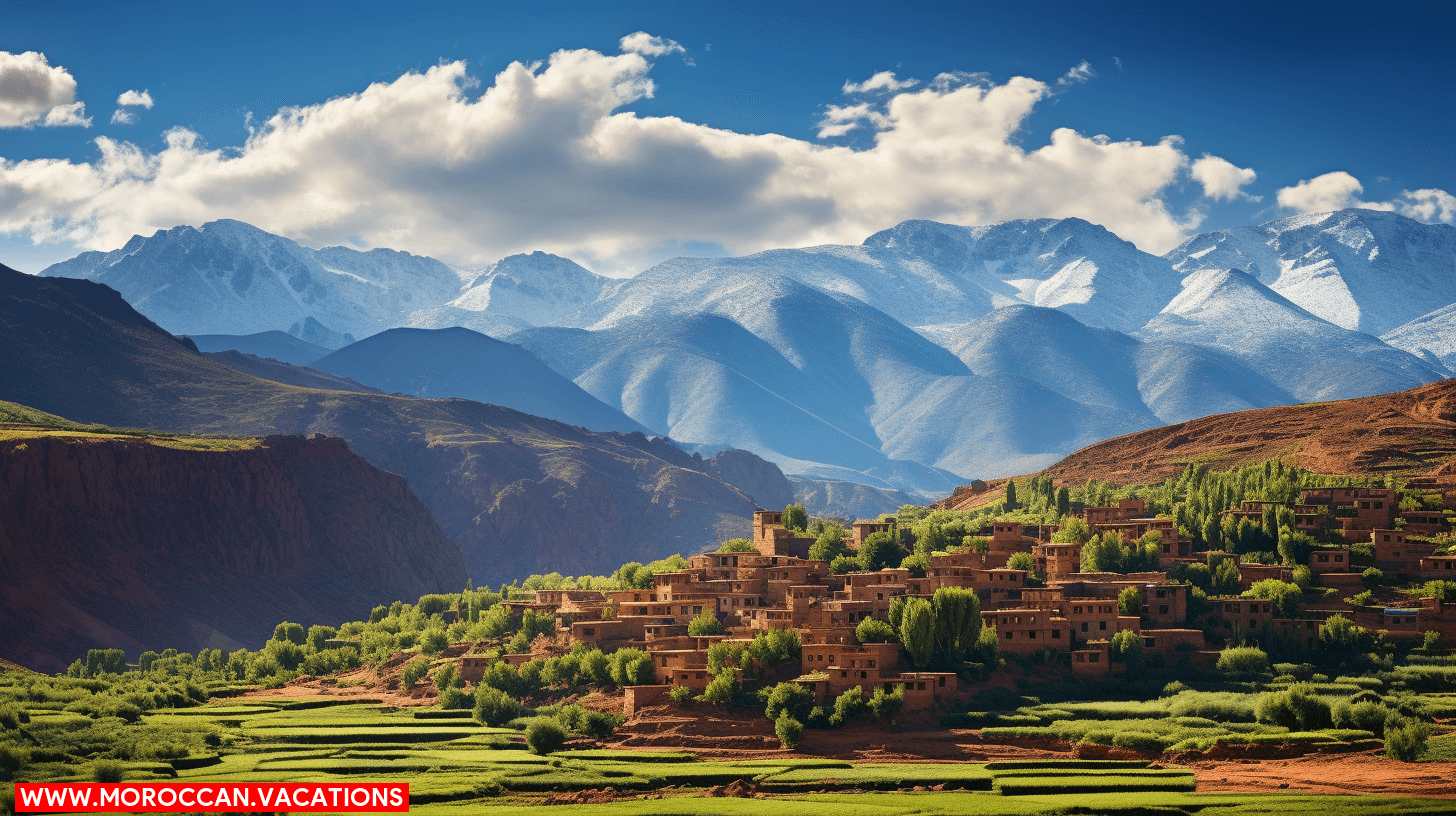

In the heart of the High Atlas, you’ll find a panorama of breathtaking beauty that’s truly beyond compare. Imagine gazing at towering snow-capped peaks, their imposing stature a testament to the Atlas Geology, a fascinating tapestry of ancient rock formations shaped by millions of years of tectonic movements.
As you hike through deep valleys, you’ll encounter an ever-changing spectacle of landscapes, each a masterpiece painted by the relentless hand of Climate Changes. Lush, green meadows give way to barren, rocky slopes, testament to the region’s diverse ecosystems. You’ll feel the crisp, refreshing air, a gentle reminder of the altitude you’re conquering.
You’ll tread upon paths that wind through a mosaic of Berber villages, where life thrives amidst the harsh mountainous terrain. The sight of verdant terraces, carefully carved into the mountainside by generations of Berber farmers, may leave you in awe.
At dusk, when the setting sun casts a warm, golden glow over the rugged terrain, you’ll realize the true magnificence of the High Atlas. The views are immeasurable, the experiences unforgettable. Here, in this realm of freedom, you’ll lose yourself in the grandeur and fall in love with the raw, untouched beauty of the High Atlas.
Wildlife Encounters in the High Atlas
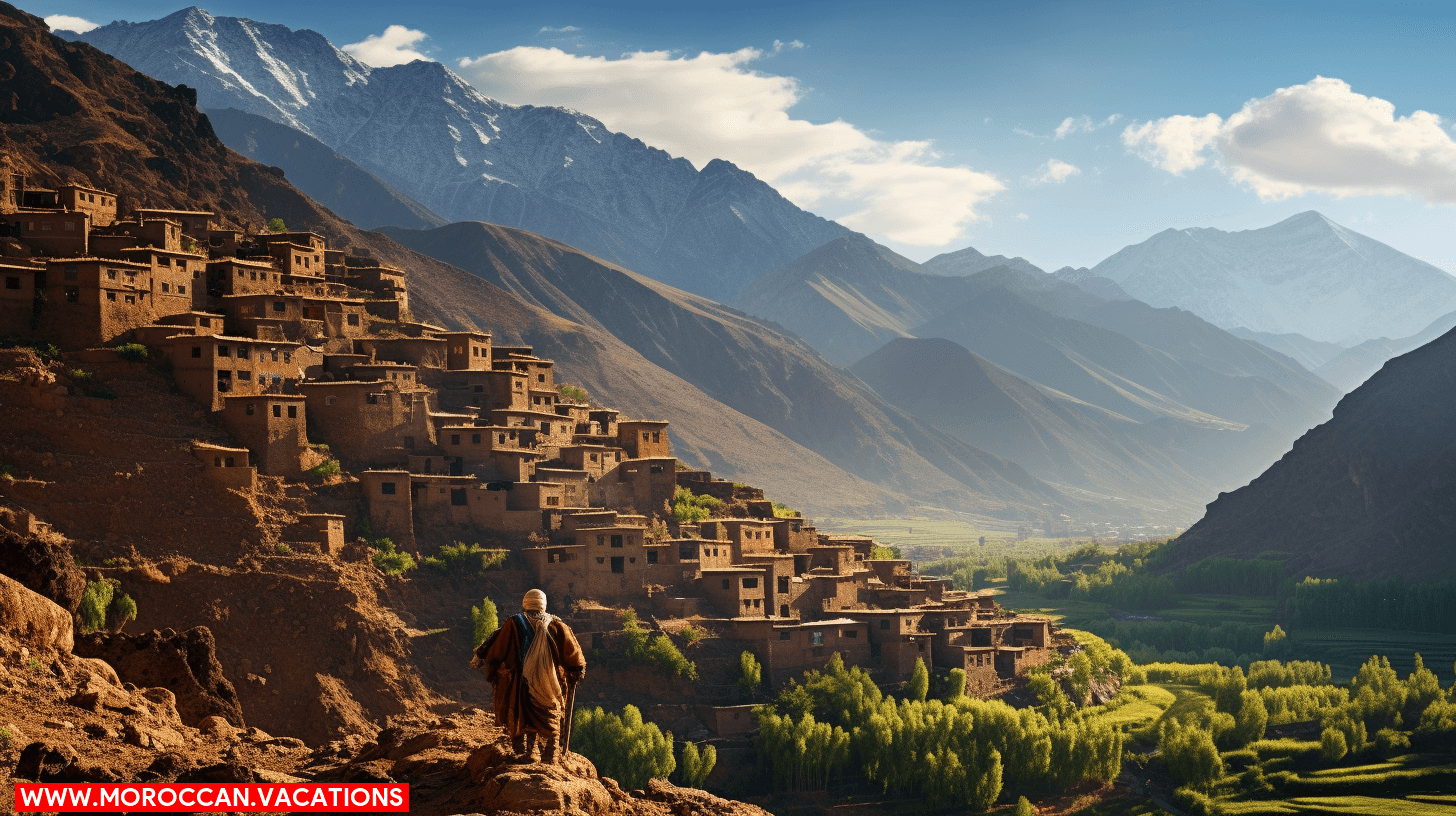

You’ll encounter a myriad of wildlife species in the High Atlas, each adding a unique touch to your adventurous trek. The rugged terrain and diverse climate provide an ideal habitat for various endemic species, offering you an exciting opportunity for flora exploration.
As you navigate the winding trails, you’ll be greeted by:
- The Barbary macaque – This primate, unique to North Africa, can often be spotted frolicking among the trees, their playful antics a delightful sight.
- The Atlas Mountain Viper – Though they can be dangerous, these elusive snakes add a thrilling edge to your journey.
- The endemic Atlas Cedar – These towering trees are a testament to the region’s rich flora, their majestic presence enhancing the beauty of your surroundings.
- The North African Leopard – While sightings are rare, just knowing that these elusive creatures roam the same paths adds an element of excitement to your trek.
The High Atlas isn’t just about snow-capped peaks and Berber villages. It’s a living, breathing testament to nature’s bounty. So, lace up your boots and immerse yourself in this wild adventure, where each step brings you closer to the heart of Mother Nature.
Essential Hiking Gear and Equipment
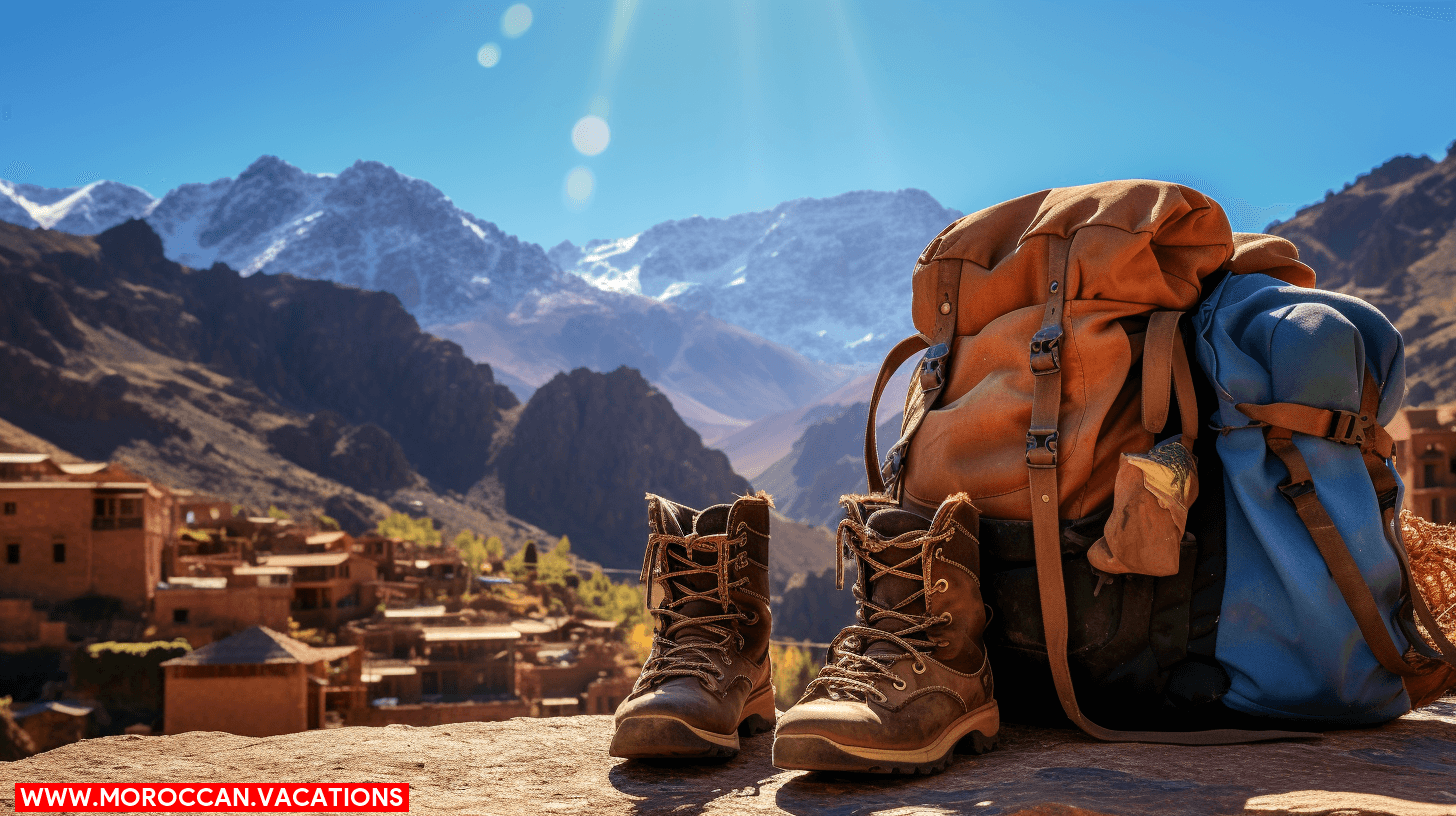

Before embarking on your journey through the diverse landscapes of the High Atlas, you’ll need to pack the right gear – from sturdy boots to reliable navigation tools, these essentials ensure your exploration is both safe and enjoyable. Your gear is your lifeline in these wild terrains. Hence, gear maintenance is crucial. Keep your boots clean, your backpack light, and your equipment in top-notch condition.
Your clothing should have weather adaptability. Remember, the High Atlas is a region of extremes. From the scorching Berber villages to the snow-capped peaks, you’ll encounter a spectrum of weather conditions. Layering is key. Invest in moisture-wicking base layers, warm mid-layers, and a waterproof outer layer.
Don’t forget essential navigation tools. A compass and map are must-haves, even if you’re relying on a GPS. Also, pack a multi-tool kit – it’s a small item that can make a big difference when you’re in a pinch.
Lastly, remember a first aid kit. It’s a vital item that can address minor injuries on the trail.
In the untamed wilderness of the High Atlas, freedom comes with preparation. Pack wisely, maintain your gear, and embrace the adventure.
Safety Tips for Mountain Hiking
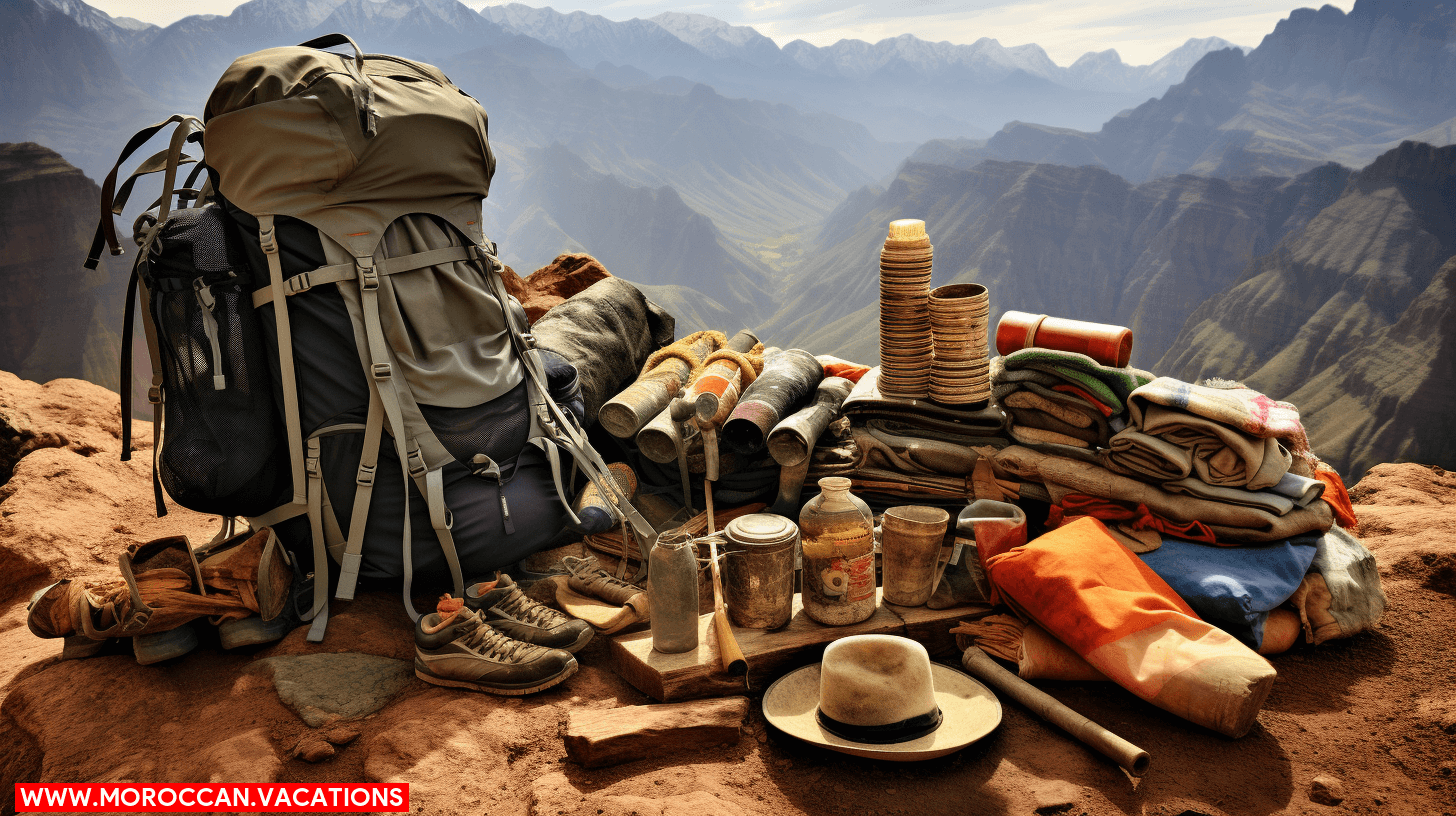

After packing up your gear, it’s crucial that you’re also armed with knowledge about safety precautions for mountain hiking in the High Atlas. Your safety is paramount, and the exhilaration of the hike shouldn’t overshadow these essential tips.
- Altitude Sickness Prevention: As you ascend, the air becomes thinner. To prevent altitude sickness, you should ascend slowly, hydrate frequently, and eat a high-carb diet.
- Emergency Protocols: Whether it’s a twisted ankle or an unexpected storm, you need to know the appropriate response. Always have a plan, communicate your route to someone not on the hike, and carry a compact first aid kit.
- Weather Conditions: The weather can change rapidly in the mountains. Check the forecast before you set off, and be prepared with suitable clothing and gear.
- Terrain Familiarity: Understand the terrain you’ll be traversing. Steep slopes and rocky paths require careful navigation. Remember, it’s a hike, not a race.
As you tread the ancient paths of the High Atlas, let the beauty of the landscape inspire you, not intimidate you. Armed with these tips, you’re ready to conquer the mountains safely and confidently. Embark on this journey of freedom, but never underestimate the mountain’s wild nature.
Reflecting on Your High Atlas Adventure


Once you’ve safely descended from the towering peaks of the High Atlas, it’s time to pause and reflect on the remarkable adventure you’ve just undertaken. Every step of your journey, from the vibrant Berber villages to the snow-capped summits, has contributed to a deep emotional impact and a personal transformation that’s hard to put into words.
Let’s try to capture some of the essence of this experience. Consider the table below:
| Aspect | Reflection |
| Physical Challenge | You’ve pushed your body beyond its limits, discovering strength you didn’t know you possessed. |
| Cultural Insights | The Berber villages revealed a way of life that’s both simple and rich, challenging your preconceptions. |
| Natural Beauty | The stunning landscapes of the High Atlas have awakened a new appreciation for the natural world within you. |
| Personal Growth | This journey has stirred something in your soul, prompting a personal transformation that’ll shape your future adventures. |
Reflecting on your High Atlas adventure, it’s clear that this was more than just a hike. This was a quest for freedom, a journey of self-discovery, and a testament to your adventurous spirit. So, hold on to these memories, they’re your treasure.
Introducing Ayoub Karbachi, a brilliant wordsmith and curator of the Moroccan Vacations website. Prepare to immerse yourself in mesmerizing narratives and extraordinary moments, as he unveils the allure of Morocco's captivating destinations like never before.
Related Articles
Summit Views: Rock Climbing Adventures in Dades Valley
Discovering Dades Valley You're a thrill-seeker, right? Well, picture this: you, conquering the rugged cliffs of Morocco's Dades Valley. This isn't your ordinary adventure. No, it's a heart-pounding, adrenaline-pumping journey of rock climbing like you've never...
Thrill of the Ride: Quad Biking Adventures in Dades Valley
Experience the thrill of quad biking adventures in Dades Valley. Explore rugged terrain, picturesque landscapes, and Berber villages on an adrenaline-fueled ride. Unleash your inner adventurer and conquer the Moroccan wilderness.
Riverside Serenity: Scenic Rafting in Dades Valley
Experience riverside serenity with scenic rafting adventures in Dades Valley. Navigate through breathtaking landscapes and rugged canyons while immersing yourself in the tranquility of Morocco’s natural beauty. Join us for an unforgettable rafting excursion in Dades Valley and embrace the thrill of adventure amidst picturesque surroundings.

